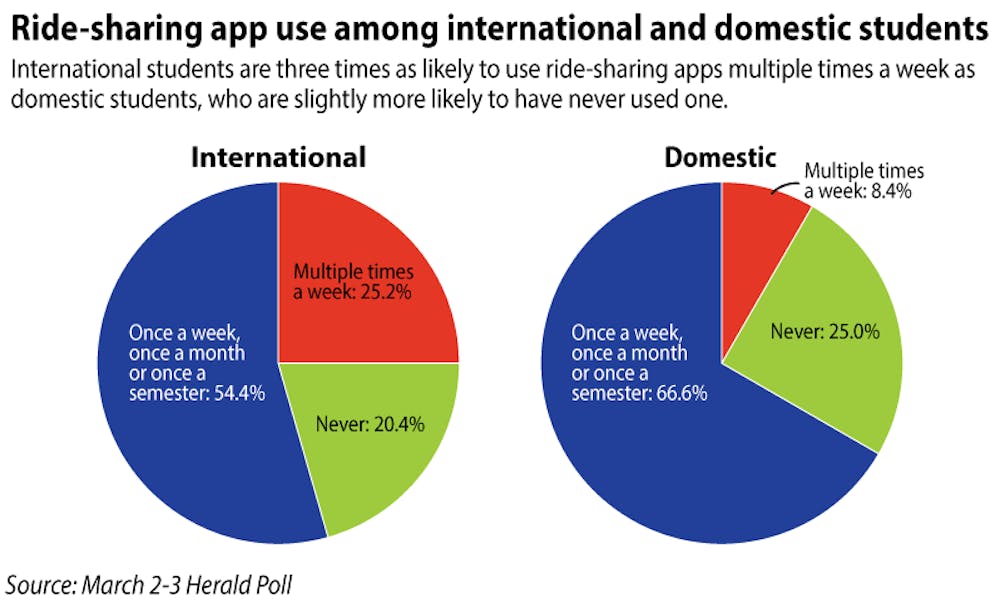A Herald poll conducted March 2-3 found that international students use ride-sharing mobile apps such as Uber and Lyft more often than domestic students. Of the international students surveyed, 25.2 percent reported using these apps more than once a week, while only 8.4 percent of domestic students reported this frequency.
Several students attributed this trend to the facts that international students are more familiar with these modes of transportation and often use them to travel off campus.
Uber, an app that lets users request rides from nearby registered drivers, offers a taxi or private driver experience to which some international students are accustomed.
“Where I’m from, it’s actually pretty common to have a car and driver,” said Bianca Eyales ’17 from Manila, Philippines. “When I’m home, I’m driven around the entire time and will occasionally use taxis,” she said. Eyales uses Uber once or twice per weekend and occasionally once during the week.
“In London, everyone takes cabs,” said Alex Hester ’18. At Brown, his international friends hail “entirely from urban areas” and are used to taking taxis, he said.
“Everywhere I would go, I went with a taxi,” said Isabella Amram ’17 of Istanbul, Turkey. “I don’t drive there because it’s much more efficient to use public transportation and taxis,” she said.
Omar Ben Halim ’15 of London, United Kingdom tied frequent Uber use to the higher socioeconomic statuses of some international students. The University’s need-aware financial aid policy for international applicants, as well as the financial means needed to attend a school overseas, makes it so that “on average, you’re getting richer international kids, and therefore they’ll use Uber more because they can,” he said.
Even for domestic students who have the financial means to use Uber, the idea “never really crosses their minds,” said Beatriz Vilela dos Reis Vianna ’18 of Sao Paulo, Brazil. “It doesn’t occur to them to get an Uber somewhere unless it’s super cold,” she said.
The nature of requesting and waiting for a ride from Uber contributes to this phenomenon, Vianna said. “You’re used to not waiting for anything, and the idea of waiting three minutes for an Uber is foreign,” she said, adding that she is used to waiting this amount of time for a cab at home.
For some, the structure of Uber resembles that of taxi apps at home. 99Taxis is an app similar to Uber that is commonly used in Brazil, Vianna said. Taxibeat is a popular app in Greece, said Anthony Kanellopoulos ’16 of Athens, Greece.
Several international students also cited past experiences with nightlife in their home countries as spurring them to take ride services to parties off campus. For many, these parties at downtown clubs hold greater allure than Greek or athletic house parties on campus.
“In Istanbul, we never had any house parties,” Amram said. “We only went to clubs. I am not used to the sport house parties and all of that. It was very unfamiliar to me.”
“The club scene has a much higher percentage of internationals than the usual party scene here, so we’d be more likely to Uber out to clubs,” Hester said.
“International students like going down the hill a little more than American students, hence taking the car ride,” said Harkaran Uppal ’16 of New Delhi, India.
An additional factor is that “international kids are much less likely to own a car,” Halim said, adding that this causes them to look elsewhere for modes of transportation.
All international students interviewed voiced their preference for Uber rather than Lyft, citing pricing, popularity and convenience.
Valentin Perez ’18 of Cancun, Mexico, who uses ride-sharing apps two or three times per week, said he relies more on Uber than Lyft. “I like startups a lot, so I’m always looking into what they do,” he said.





